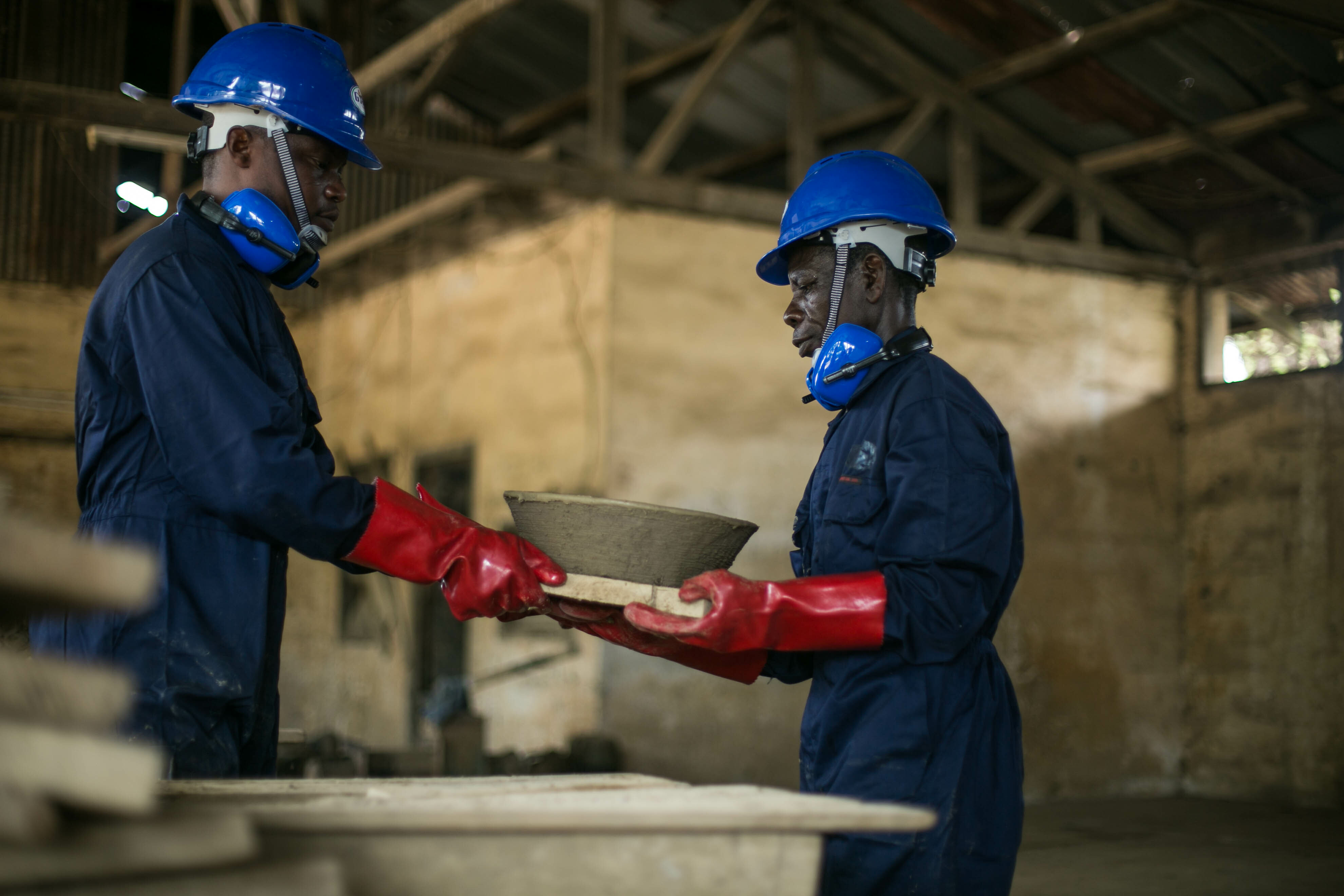Emerging best practices and examples of how clients of ours are getting to net zero


In September 2020, Boston Consulting Group (BCG) pledged to achieve ‘net-zero climate impact’ by 2030 and, from there, to become climate positive, removing more carbon from the atmosphere than it emits each year. The firm has outlined 3 key steps on their net zero journey: Reduce, Remove, Engage. To reduce its footprint, BCG has committed to cut its emissions intensity in half by 2025 (compared to a 2018 baseline). This target is one of the most ambitious in its sector and was validated by SBTi as aligned with the goal of limiting temperature rise to 1.5°C. By 2030, BCG will finance carbon removal projects to remove all the emissions it is unable to avoid has also committed $400 million over this decade to advance climate action with clients and partners.
Boston Consulting Group (BCG) has been a pioneer in business strategy since its 1963 founding in Boston, Massachusetts. The firm’s core purpose has always been to enable businesses to adapt to an evolving corporate landscape and build lasting competitive advantage. Today, BCG has a global presence with 22,000 employees spread across offices in more than 90 international cities and clients from the private, public, and not-for-profit sectors.
BCG has brought the same ethos and commitment to sustainability too. The firm prides itself in being guided by the highest standards of ethics and conduct, with values that aim to do right by people and planet.
BCG has been a CarbonNeutral® certified company since 2018. This means the firm (i) measures its footprint aligning with the GHG Protocol and corporate best-practice1, (ii) has set science-based targets to reduce emissions over time, and (iii) purchases and retires a volume of independently verified high-quality carbon credits that is equivalent to its annual carbon footprint.
By working with Climate Impact Partners, BCG has financed an array of high-quality projects that either avoid the release of emissions, such as projects that prevent deforestation, or remove emissions from the atmosphere, such as reforestation projects. In 2020, BCG retired carbon credits from 14 projects across 12 countries, and its ratio of removal projects increased from about 30% in 2019 to ~40% in 2020. The firm expects that 44% of its 2021 portfolio will be from removal projects as it continues to transition towards a portfolio of 100% removal credits by 2030.
In September 2020, BCG moved beyond the CarbonNeutral® certification, and pledged to achieve ‘net zero-climate impact’ by 2030.
To do so, the firm has increased the ambition of its greenhouse gas emissions targets, and now aims to cut its emissions intensity in half by 2025 (target validated by SBTi as aligned with the goal of limiting temperature rise to 1.5°C). As part of this goal, BCG will reduce its energy and electricity-related emissions (Scopes 1 and 2) by 92% per full-time equivalent employee (FTE) by 2025 and cut its business travel emissions (Scope 3) by 48.5% per FTE by 2025 (both against its 2018 baseline year). The firm expects to meet this target largely through planned changes to ways of working and travel norms, and to achieve the remaining reductions by supporting the use of sustainable aviation fuel (SAF) for flights taken by BCG employees2 and through expected efficiency gains from airlines.
While BCG continues to focus efforts on reducing emissions, the firm understands that taking responsibility for the carbon emissions it emits today is a crucial part of any robust climate strategy. BCG will work to neutralize 100% of its emissions by 2030 but also maintain carbon neutrality en-route to net zero. To achieve this the firm will begin directing more of its finance to carbon removal credits so that by 2030, BCG will solely finance projects to remove the emissions it is unable to avoid. It publicly announced its expectation to pay $80 per metric tonne by 2030, for high-quality credits that deliver verified carbon removals alongside sustainable development benefits. BCG is also exploring opportunities to integrate engineered removal credits into its carbon offset portfolio, from technologies ensuring more permanent carbon sequestration such as Direct Air Capture and Storage. BCG will not stop there. Beyond the 2030 net zero mark, the firm has committed to become climate positive whereby it will remove more carbon from the atmosphere than it emits each year.
As a leading management consulting firm with global reach, BCG’s greatest climate impact comes from working in collaboration with its clients, to maximize the effectiveness of their sustainability policies. As such, the firm has committed $400 million to drive climate impact and action with clients and partners. Climate and sustainability consulting is the fastest-growing topic across all areas of BCG’s business. BCG has already invested over $240 million in climate and sustainability action so far this decade and was one of the leading consultancies engaged in shaping global climate action, for example through its exclusive consulting partnership with COP26.
Recognizing the firm’s leadership, BCG was the only global management consulting firm and one of only 200 companies globally to receive an A rating in the 2021 CDP Climate Disclosure.
To find out more, visit: www.bcg.com/about/net-zero.
1 BCG includes all relevant Scope 1, 2 and 3 greenhouse gas emissions sources, as well as non-GHG sources, such as the radiative-forcing impact of air travel. The firm independently verifies and reports its footprint via the Annual Sustainability Report and CDP Climate Disclosure where BCG is featured on the A-List.
2 For example, through the SkyNRG BoardNow Program, United Airlines’ Eco Skies Alliance, or Neste’s My SAF for business program, virtually replacing a share of the kerosene consumption induced by BCG’s travel with Sustainable Aviation Fuel.

In May 2021, the Co-op launched an ambitious ten-point climate action plan to achieve net zero by 2040 – a decade ahead of the UK’s own net zero target. Between 2016 and 2020, Co-op reduced the carbon footprint of its operations by 47% through investments in refrigeration, energy efficiency, and building controls. And since 2021, Co-op’s operational activities have been carbon neutral; it offsets any ongoing operational emissions through our portfolio of verified carbon reduction projects that deliver value for people and planet.
Co-op is a British consumer co-operative with strong social values at its core. Upon the organization's founding in 1844 in Rochdale, England, it was guided by an economic model, which became known as the dividend or “Divi”, whereby its customers would receive a share of profits proportionate to the purchases they made. Today, the Co-op has a diverse range of businesses spanning food, insurance, funeral care, and legal advice, with a total of 63,000 employees across the UK. Co-op’s community-focused approach to business still exists today and has spread around the world, with an estimated one billion people belonging to a co-operative and the largest three hundred co-operatives having an estimated turnover of over $2 trillion.
Co-op has brought its responsible business DNA to the climate challenge.
In 2019, Co-op set a 1.5°C-aligned Science-Based Target (SBT) to reduce absolute scope 1 and 2 GHG emissions by 50% by 2025 from a 2016 base year and committed to reduce absolute scope 3 emissions by 11% within the same timeframe. Lower soy impact in animal feed, reducing farm emissions, and greener grid energy are identified as the three biggest contributions to achieving this reduction target.
Between 2016 and 2020, Co-op reduced the carbon footprint of its operations by 47% through investments in refrigeration, energy efficiency, and building controls. And since 2021, Co-op’s operational activities have been entirely carbon neutral; it offsets ongoing operational emissions through our portfolio of carbon reduction projects that span a range of technologies including renewable energy, household devices, and forest protection. There is also an aspiration to achieve carbon neutrality among all its own brand products on its pathway to net zero.
In May 2021, Co-op launched an ambitious ten-point climate action plan to achieve net zero by 2040 – a decade ahead of the UK’s own net zero target. Its plan is guided by three core principles: follow the science, work for a fair and just transition for people, and drive systems change by working with others. This systems change includes supporting and steering the British Retail Consortium’s Climate Action Roadmap, expanding into joint purchase and supply of 100% renewable electricity, campaigning for climate action, and making lower carbon choices easier for customers and its members.
To achieve net zero by 2040, we are working with Co-op to develop a strategy to address the residual emissions it is unable to avoid. The projects that Co-op have supported, continue to support, and will support in the future, align with their commitment to ensure a fair transition while delivering positive impacts for people and communities around the world. Their approach reflects the University of Oxford’s ‘The Oxford Principles for Net Zero Aligned Carbon Offsetting’ and SBTi’s criteria for net zero targets.
To summarize, on Co-op’s journey to achieve net zero by 2040, it will place priority on carbon reduction in line with the science, compensating for unavoidable emissions in the meantime by funding high quality carbon offset projects along the way. More widely, the Co-op is campaigning for climate justice and taking a system-wide, co-operative approach to the climate challenge. It is already carbon neutral across its operations and aims to extend this to all its own brand products on its pathway to net zero.

Sky has set a bold target to become net zero by 2030. It will achieve this target by reducing its value chain emissions by at least 50% and will reach net zero by removing carbon from the atmosphere to neutralize the emissions it cannot cut, through investments in natural carbon sinks, such as forests, mangroves, and seagrass. To complement this future goal, as a step on its journey to net zero, Sky is achieving carbon neutrality. It’s been a CarbonNeutral® company since 2006 – the first media company to do so. Sky has used its carbon neutral program to engage internal teams and align with external campaigns such as Rainforest Rescue and Ocean Rescue, and built the world’s first TV to be certified as a CarbonNeutral® product: the “Sky Glass”.
Sky is a leading European media and entertainment company and is part of Comcast Corporation. Sky services its 23 million customers across six countries through apps, entertainment, sports, news and arts. With more than 30,000 employees, Sky understands that a business of its size, scale and reach has a responsibility to take bold climate action, and it has been driving positive change for people and planet for over a decade.
In February 2020, Sky started a new phase of its climate journey by committing to become net zero by 2030.
The target encompasses its entire value chain, including the emissions from 11,000 suppliers, its direct business operations, and those from the use of Sky products in the homes of millions of customers.
When it comes to the abatement of its emissions, Sky follows a science-informed approach. The company has publicly reported its carbon footprint across scopes 1, 2 and 3 for several years and uses this to drive progress against its target to halve its emissions across these three scopes by 2030 from a 2018 base year, which have been validated by the Science Based Target initiative (SBTi).
Sky’s emissions reductions will be delivered by measures including switching its entire fleet of 5,000 vehicles to zero emissions vehicles, ensuring its new studios, Sky Studios Elstree, are the most sustainable production facilities in the world, and continuing to achieve 100% renewable electricity, first reached in 2016 as part of its commitment to RE100, through on-site wind, combined heat and power, multiple green tariffs, and working with Climate Impact Partners to procure renewable electricity through Energy Attribute Certificates and reducing the emissions by customers using Sky services. Sky has also produced the world’s first automatic standby mode for its set-top boxes.
To achieve net zero at 2030, Sky will offset any remaining carbon footprint from its entire value chain through nature-based carbon removal projects such as forest, mangrove, and seagrass projects. It is supporting a reforestation project in Scotland that will plant around 200,000 native trees delivering biodiversity, landscape, and community benefits.
To complement this future goal, as a step on its journey to net zero, Sky is achieving carbon neutrality.
Through a combination of energy efficiency measures, product innovation, renewable energy generation and procurement, and offsetting residual emissions through verified carbon reduction projects, it became the world’s first CarbonNeutral® media company from its direct emissions in 2006. The carbon reduction projects Sky has financed span renewable energy in India and China, forest conservation in Brazil and Indonesia, water infrastructure in Kenya, and reforestation in Mexico. Sky has recently gone further to expand the scope of its carbon neutrality to its own productions and to build the world’s first TV to be certified as a CarbonNeutral® product – the “Sky Glass”, launched last year.
Another action that Sky continues to take on its path to net zero is to campaign for the environment. From Rainforest Rescue to Sky Ocean Rescue, and its channels – like Sky News, Sky Documentaries, and Sky Nature – Sky informs audiences, explains how they can start taking action through #GoZero, and launched the world’s first daily prime time news show dedicated to climate change. Sky Ocean Rescue will continue to champion ocean health with WWF, and rally people to #BeAnOceanHero by pledging to help save our oceans. And Sky’s £25 million impact investment fund Sky Ocean Ventures will continue to support innovations stopping the flow of plastic into the sea.
In summary, Sky recognizes that net zero is the ultimate goal if we are to advance the transition to a low carbon economy, but it also understands that taking responsibility for today’s emissions and being carbon neutral is a crucial part of the journey there. By partnering with Climate Impact Partners, Sky has offset the emissions it is unable to avoid through more than 30 verified emissions reductions or removals projects around the world.